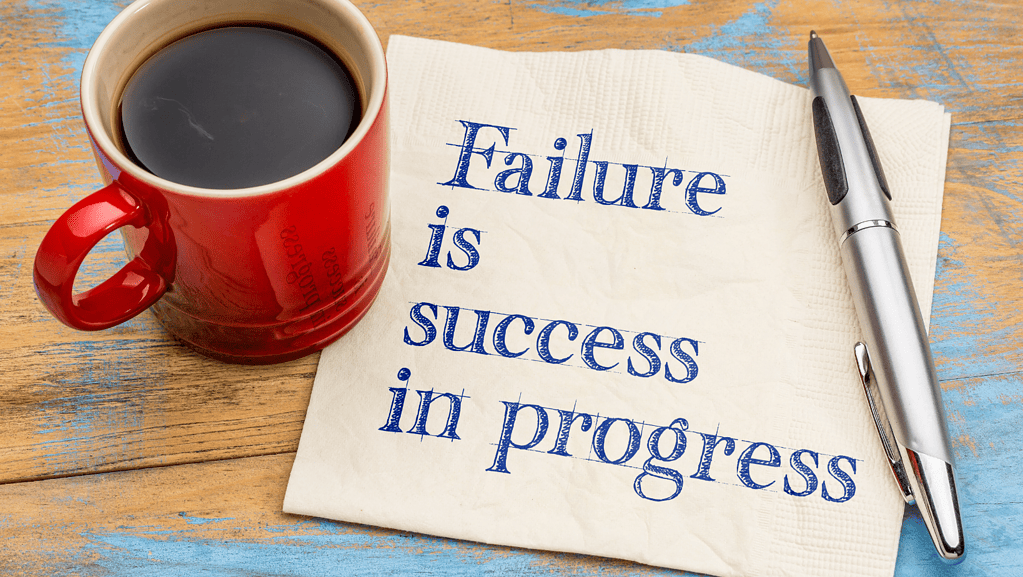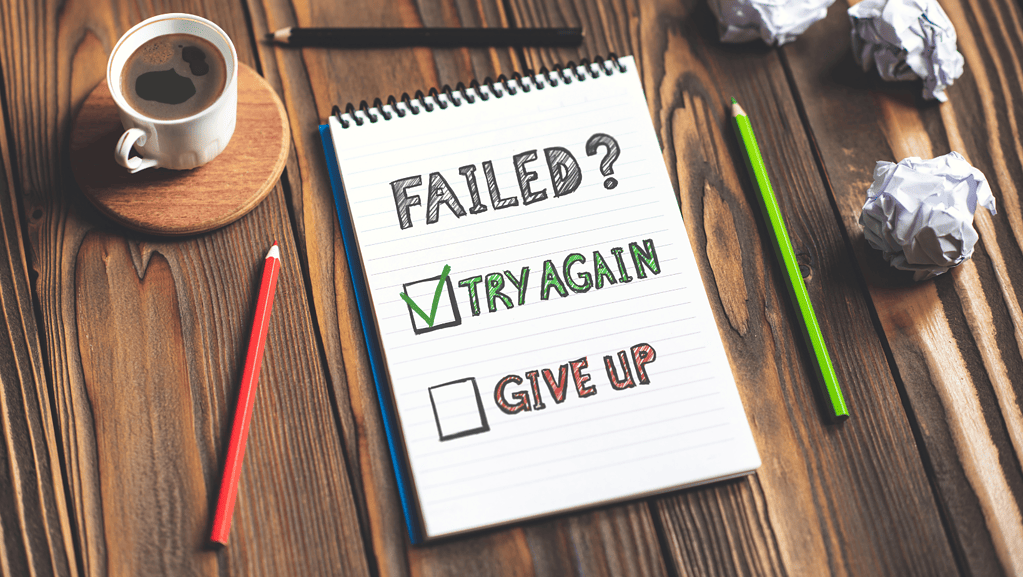
This post may contain affiliate links. For more information, read the full disclosure here.
Facing failure can be disheartening, but it’s an essential part of personal growth. Instead of avoiding missteps, it’s crucial to understand how does failure help you grow.
By embracing your shortcomings and learning from them, you’ll develop a deeper understanding of your abilities, making you more resilient and adaptable in the face of challenges.
When you experience failure, it’s an opportunity to reevaluate your approach and find ways to improve. Nobody gets everything right from the get-go, and you’ll likely encounter setbacks as you work towards your goals.
By recognizing and addressing your limitations proactively, you’re better equipped to bounce back and turn those stumbling blocks into stepping stones for success.
Remember that failure isn’t a negative reflection of your worth or capabilities. Instead, it serves as a catalyst for growth, pushing you to refine your skills and persevere in the face of adversity.
So, the next time you face a setback, don’t shy away from it; embrace failure as your teacher and let it guide you toward self-improvement and success.
How Does Failure Help You Grow?
Failure is a natural part of the learning process, and embracing it can lead to significant personal and professional growth.
By understanding that failure isn’t the end but an opportunity to learn and improve, you’ll be able to turn negative experiences into valuable lessons.
One crucial reason to learn from failure is that mistakes help you identify areas for improvement.
Nobody is perfect, and falling short occasionally is a reminder that there’s always room to grow. When you take a step back and analyze your failures, you can:
- Determine what went wrong
- Gain insight into your blind spots
- Develop a plan for future success
By doing so, you’ll be better equipped to avoid making the same errors in the future and be one step closer to achieving your goals.
Another vital aspect of learning from failure is that it builds resilience. Life is full of challenges, and not everything will go your way.
By embracing setbacks and learning to adapt, you’ll develop the ability to bounce back from adversity.
This resilience can be extremely beneficial, whether you’re navigating the ups and downs of your personal life or a competitive professional landscape.
Moreover, learning from failure promotes creativity and innovation. When you’re afraid of failing, you’re more likely to avoid risks and stick to the status quo.
But embracing failure and the invaluable lessons it offers can give you the confidence to think outside the box and discover innovative solutions. By overcoming your fear of failure, you’ll be more inclined to:
- Experiment with new methods
- Test unconventional ideas
- Challenge the norm
Lastly, understanding the importance of learning from failure helps you build empathy and better relationships.
By acknowledging and accepting your own shortcomings, you’re more inclined to understand and empathize with others when they’re going through a difficult time.
This improved sense of empathy can lead to stronger relationships, both personally and professionally.
Embracing failure and learning from it is an essential part of personal development and progress.
By identifying areas for improvement, building resilience, fostering creativity and innovation, and improving empathy, you’ll be better equipped to face whatever challenges life has in store for you.

How Failing Teaches Resilience
Learning from failure not only helps you grow, but it’s also an essential way to build resilience. When you experience failure, it may feel like a setback, but it’s an opportunity to develop the skills and mindset needed to bounce back even stronger.
One way failure fosters resilience is by forcing you to adapt. When you face adversity, you learn new strategies to overcome challenges.
This adaptability expands your problem-solving skills and improves your ability to handle future obstacles with ease.
Another significant benefit is that failure teaches emotional intelligence. When setbacks occur, it’s important to manage your emotions and maintain a positive outlook.
Failure provides you with the opportunity to practice controlling your reactions and staying focused on your goals. As you develop your emotional intelligence, you’ll find that it becomes easier to remain optimistic and persevere through difficult times.
Failing also builds self-awareness. You start to understand your strengths and weaknesses and how to utilize them in different situations.
This newfound self-awareness allows you to improve in areas where you might have previously struggled, ultimately increasing your resilience.
Some benefits of failure leading to increased resilience include:
- Developing problem-solving skills
- Enhancing emotional intelligence
- Boosting self-awareness
Moreover, resilience gained from failure often sparks creativity and innovation. When you’re forced to take a step back and re-evaluate, generating new ideas to approach challenges is common. This creative thinking is crucial for personal growth and success in various aspects of life.
Lastly, facing failure makes you comfortable with the uncomfortable and helps you cultivate grit. Grit is described as the ability to maintain passion and perseverance toward long-term goals despite setbacks and challenges.
As you become more comfortable facing and learning from failures, you develop the tenacity required to achieve your objectives.
Developing Self-Reflection And Adaptation
One essential aspect of personal growth is developing self-reflection and adaptation skills. When you experience failure, it’s important to analyze and learn from it.
Through the practice of self-reflection, you come to understand your strengths, weaknesses, and areas for improvement, allowing you to become better equipped for future challenges.
There is a process for effective self-reflection after experiencing failure:
- Firstly, make a habit of setting aside time to review your experiences. By taking the time to think deeply about your actions and choices, you’ll gain valuable insights into what went wrong.
- Secondly, don’t be afraid to ask for feedback from those involved. Other people’s perspectives can provide useful information and help you uncover blind spots in your understanding of a situation.
- Thirdly, be honest with yourself and identify areas where you might have made mistakes or had room for improvement. Recognize that even if the failure isn’t solely your fault, there’s still valuable learning to be gained from reflecting on your own actions.
- Finally, focus on adapting your approach for future endeavors based on the insights you’ve gained through self-reflection. This could mean altering your strategy, developing new skills, or seeking support from others.
Adaptation is also crucial when dealing with failure. Being flexible and open to change is essential as you work towards your goals.
By remaining adaptable, you become more resilient and better able to handle setbacks that might come your way. Some ways to develop adaptability include:
- Embracing a growth mindset, which encourages the belief that your abilities can be developed through hard work, learning, and perseverance.
- Learning to let go of your attachment to specific outcomes and instead focus on the process of growth and improvement.
- Experiment with different approaches to reach your goals, as there is often more than one pathway to success.
Overall, the ability to self-reflect and adapt is crucial for learning from failure and fostering growth.
By implementing these practices in your own life, you’ll be better equipped to handle setbacks, learn from your mistakes, and ultimately become more successful in the long run.
Embracing Growth Mindset Through Mistakes
Mistakes play a crucial role in the journey toward personal growth. Recognizing that failure can lead to progress, it’s essential to develop a growth mindset.
By doing so, you’ll be better equipped to handle setbacks and make the most out of challenging situations. Here’s how you can embrace a growth mindset through your mistakes.
Firstly, it’s important to accept mistakes as a natural part of the learning process. The fear of failure can hold you back from taking risks and trying new things.
By letting go of perfectionism, you’ll be more open to exploring opportunities and facing challenges head-on. When you experience setbacks:
- Reflect on the situation
- Identify areas for improvement
- Develop strategies for future success
Another key aspect of the growth mindset is to view challenges as opportunities. When faced with obstacles, remember that they’re opportunities for growth and learning. Adopt a positive outlook and approach these challenges with curiosity and enthusiasm.
To make the most out of your mistakes, focus on gaining knowledge and developing new skills. You can:
- Read books, and articles, and/or attend workshops
- Seek feedback from mentors and peers
- Practice consistently to refine your skills
It’s also essential to maintain a healthy approach to self-assessment, recognizing our own shortcomings and celebrating our achievements.
In this way, you’ll be more likely to stay motivated and continue pushing yourself to grow. To achieve this balance, be sure to:
- Set realistic expectations and achievable goals
- Celebrate progress, no matter how small
- Monitor your self-talk and avoid being overly-critical
Lastly, it’s vital to surround yourself with a supportive network of like-minded individuals who also embrace a growth mindset.
These relationships can help reinforce your commitment to self-improvement and provide valuable insights, feedback, or encouragement.
As you continue to make mistakes and learn from them, you’ll find that they become essential stepping stones toward your personal growth. By fostering a growth mindset, you have the power to transform your failures into invaluable learning experiences.

The Connection Between Innovation And Failure
When seeking personal growth, you may often wonder how failure can help you grow. One key area to examine is the connection between innovation and failure. In fact, embracing failure can be essential to creativity and innovation.
In the world of entrepreneurship, failure is seen as a stepping stone to success. It’s believed that the more you fail, the more you learn, which eventually leads you to discover successful solutions.
By viewing failure as an opportunity for growth, you foster a mindset that encourages exploration, experimentation, and ultimately, breakthroughs.
Several influential figures have stressed the importance of failure in innovation:
- Thomas Edison, the inventor of the lightbulb, once said, “I have not failed. I’ve just found 10,000 ways that won’t work.”
- Henry Ford, the founder of Ford Motor Company, remarked, “Failure is simply the opportunity to begin again, this time more intelligently.”
- Elon Musk, CEO of SpaceX and Tesla, has recurrently argued that failures are valuable lessons, stating, “If things are not failing, you are not innovating enough.”
Reflecting on these quotes, it’s clear that learning from mistakes has played a significant role in the accomplishments of these great innovators.
A few reasons why failure is linked to innovation include:
- Risk-taking: By taking calculated risks and accepting that failure is a possibility, you allow yourself the opportunity to develop creative solutions.
- Learning from mistakes: Failure helps you identify what works and what doesn’t, enabling you to refine your approach and improve future outcomes.
- Building resilience: Experiencing failure helps to build your mental toughness and adaptability, crucial traits for successful innovation.
The importance of failure in innovation can be supported by several studies. Harvard Business Review published findings that show organizations that embrace failure ultimately succeed in the long run.
Additionally, research conducted by the University of California, Davis, discovered that the most successful scientists from their study faced failure more often than their less successful peers.
These individuals used their failures as learning opportunities, leading them to greater achievements.
In Conclusion: Transforming Failure Into Growth
Embracing failure can become one of your life’s most valuable learning experiences. Through these discouragements and letdowns, you find the strength to overcome obstacles, develop resilience, and foster personal growth.
Indeed, failure is just a stepping stone to achieving your goals. Consider these benefits when you use failure to your advantage:
- Gaining insights: Through failure, you’ll gain new knowledge and skills, helping you to improve and perform better in future endeavors.
- Boosting creativity: Being faced with challenges forces you to approach problems from different angles, igniting innovative thinking.
- Building resilience: Cultivating a never-give-up mindset helps you maintain a goal-oriented mentality, taking setbacks in stride.
- Developing empathy: Experiencing failure makes it easier to relate to others facing difficulties, fostering supportive relationships.
It’s crucial to remember that the key to transforming failure into growth lies in your perspective. Altering how you view setbacks is essential for success.
Adopting a growth mindset will help you recognize that failure is an opportunity to learn and develop.
When faced with setbacks, take a moment to analyze the situation objectively. Ask yourself these questions:
- What can be learned from this experience?
- How can this setback be used to advance my goals?
- What skills or knowledge need improvement?
By answering these questions, you’ll be able to develop a strategy to overcome future challenges and become even stronger.
Moreover, surrounding yourself with supportive individuals who genuinely want you to succeed is vital.
A network of encouraging friends, family members, and mentors will provide both external and internal motivation, helping you rise above failures and continue on your path toward growth.
In the end, transforming failure into growth is all about embracing setbacks as invaluable learning opportunities.
By changing your mindset, analyzing your experiences, and building a strong support network, you’ll soon find that each failure is merely a stepping stone for even greater success. So, don’t be afraid to fail – it’s through these experiences that true growth is achieved.
